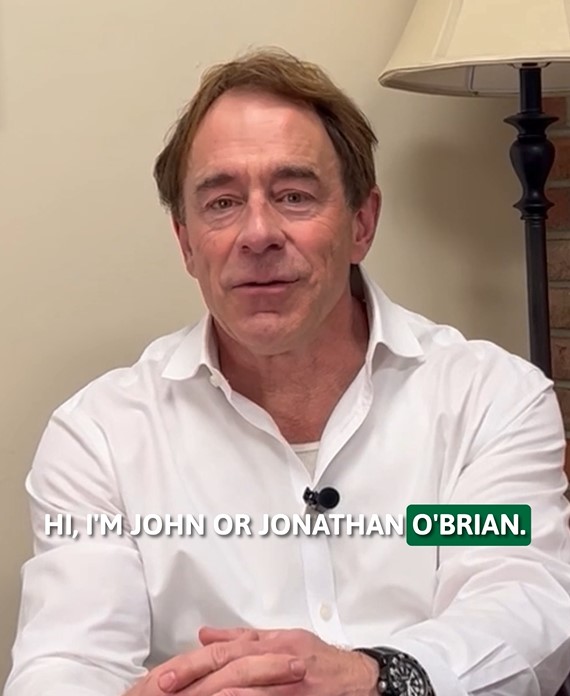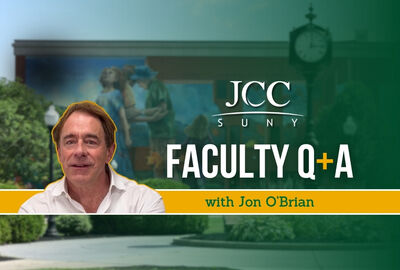Jon O’Brian has been a History professor at SUNY Jamestown Community College since 1998. He teaches United States and World History.
O’Brian is a JCC graduate who went on to earn a Business Administration degree from SUNY Fredonia, and master’s and doctorate degrees in history from the University at Buffalo.
O’Brian directs JCC’s China internship program and leads Scandinavian Culture Days on the Jamestown Campus. Away from JCC, he directs the YMCA summer program at Camp Onyahsa.
What made you pursue a career in history?
O'Brian: I loved history as a kid. Now I'm older, so I'm going back to the comic book era. But while my friends were reading about superheroes, I was reading about World War II, which doesn't really lend itself to a comic, but nonetheless, there were comics in that era from World War II that were, I thought, fairly realistic. And I really loved it. I remember getting for a Christmas present the American Heritage picture history of World War II as a kid, which is an odd Christmas gift.
But I kind of got turned off to history, no fault of my social studies teachers in high school, but I kind of got turned off to it. And then because of general education, here at JCC as a student, it rekindled a love for history. I started off as a business major, and I ended up doing a dual major.
What type of history are you most passionate about?
O'Brian: I really enjoy history at the local level. I think this is where world events hit the individual. The intersection is at the local level. We live in a locality. We're affected by levels of connection, from the region to the state to the nation to the globe. But we live it at a local level, so I really enjoy local history.
I like to focus on the 1920s, where there's really kind of a lack or a dearth of what we would say historiography. There's just not much done, oddly enough, on the 1920s, in my opinion. So I'd like to look at the 1920s at the local level, especially this ongoing reform, make life better, especially for the working class in a period in which most historians say, no, it's just conservative. It's the Jazz Age. It's a retreat from reform, maybe at the national level, but I see it at the local level continuing.
What attracted you to attending JCC and eventually returning to teach here?

and how it was rekindled during his time as a JCC student.
O'Brian: Well, I grew up in Jamestown. I'm an alumnus of JCC. Again, I think part of my disinterest in history at the high school level was my own fault, but I wasn't the best high school student, and I ended up at JCC. There was some family dysfunction and financial reasons. This was kind of the only choice, but it was the best choice in retrospect because I actually did quite well. I connected with professors here and the opportunity to choose my own courses and to follow my own passions and did well.
Frankly, I saved a lot of money. I lived at home. There's no shame in that, and I actually worked on campus as a lifeguard and actually taught lifeguarding when I was like 19 in the Phys Ed building here. And I went on to Fredonia without any debt, and I know that's really hard for students to do nowadays, but I was able to stay debt-free.
I actually attended JCC on the USA Scholarship, so I guess I didn't do that poorly in high school, but I applied myself much more here and graduated summa cum laude from Fredonia and went on to do a master's degree at the University of Buffalo in history.
In between there, because I had not fallen into debt, and though I didn't come from a lot of means, I was able to spend a semester in Paris, France, and traveled around Europe, and when I came back from that, I really just wanted to do history, so I finished up at Fredonia with a history degree and went on to the University at Buffalo for a master's in history. Started teaching here, put all my graduate studies aside, and then returned just about 10 years ago to UB to begin doctoral studies, and I completed that.
So it's been a lifelong journey that I really enjoyed.
What is your favorite class to teach?
O'Brian: I love teaching early world history, so that's world history prior to 1500, which is kind of a temporal parameter or bookend for the pre-modern world. I just love teaching it because so much of what happened in that pre-modern past is so relevant for today. Philosophy, religion, the ways of life, culture, it still connects to us today.
What message do you have for students considering JCC for college?
O'Brian: I just think there's connection with professors who can really empathize with the lives of high school students.
Of course, there's affordability, which I think folks maybe don't tell young people about enough. Like when you're in your 30s and you're still carrying college debt, it makes a big impact on starting your life and getting the automobiles and eventually homes and whatever you decide to do, you end up carrying around a lot of debt burden, which again, thanks to JCC, I did not have. Also, I was pretty frugal. I worked a lot too.
I just think the flexibility and schedule and the connection with caring professors really makes JCC a very attractive option that students in high school should really consider.
Why should older, non-traditional students, attend JCC?
O'Brian: Nobody cares what your age is. We need to continue learning. Learning doesn't stop when you attain a degree or if you've never went to school. Learning is lifelong, and I think JCC helps to promote that. Students of any age, any background, it's not just students who don't come from families with financial wherewithal.
You can come from any economic background and attend JCC. We really honor that diversity. Any skin tone, ethnicity, religious background, nationality, age, ability, or developmental disability, you're welcome here.
----
JCC offers an A.A. Social Sciences degree for which students can focus their studies on history, anthropology, geography, political science, or economics.
Request more information about those and other JCC learning opportunities.

